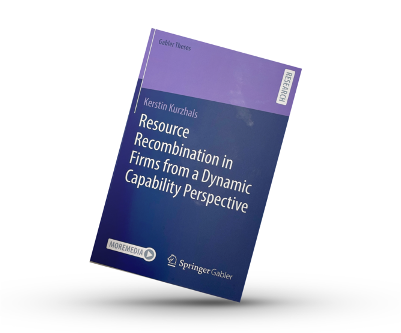
1 December 2021 | Münster
Kerstin Kurzhals, junior professor and team leader of the research line "Science-to-Society" from S2BMRC published her Ph.D.-Thesis on Resource Recombination in Firms form a Dynamic Capability Perspective at Springer Gabler.
The dissertation was conducted as part of a cooperative doctoral program between FH Münster University of Applied Sciences (Germany) and Coventry University Business School (UK). The dissertation was submitted to University of Coventry and completed with a disputation (viva voce). For Dr Kurzhals' doctorate, Prof. Dr. Thomas Baaken was supervising her research on the part of FH Münster University of Applied Sciences - in addition, Dr. Gerry Urwin and Prof. Tom Donnelly completed the team of supervisors as second supervisor and co-promoter on the part of Coventry University
This book elaborates the concept of Resource Recombination in firms from a Dynamic Capability perspective. Dynamic Capabilities of firms are defined as its ability to integrate, build and reconfigure internal and external competencies to address rapidly changing environments which is crucial in order to develop new innovative Resource Recombinations. While the concept of Resource Recombination to generate innovations has been widely discussed and is recognised as significant in today's knowledge economy, the insights in the determinants and antecedents that drive Resource Recombinations in firms have still been limited. The failure of firms to find systematic ways to identify, evaluate and successfully combine existing resources is well documented in research, stemming from a lack of understanding of how organisations can strategically and practically approach and foster Resource Recombination as a source for continuous innovation generation.
With the investigation of the role of Dynamic Capabilities in the process of innovation generation through Resource Recombination, this research addresses some existing shortcomings in the Dynamic Capability literature, where there is a crucial need to better understand the interrelationship between Dynamic Capabilities, the firm`s resource base, and innovation through Resource Recombinations. This research contributes to the resource and competence based research by developing and empirically testing a conceptual model of factors influencing Resource Recombination in firms.
In line with the resource based view (RBV), empirical findings confirm that the firm`s resource endowments explain - in part - value creation in firms. But moreover this study found that the effectiveness of those resource endowments to provide productive performance outcomes depends on the extent to which firms possess specific Dynamic Capabilities: Sensing and Learning capacities are important for building the potential value of resources for Resource Recombination, while Integrating and Coordinating capacities are necessary for realising the value creation potential of those resources by developing new Resource Recombinations. Accordingly, regarding their role and effects towards Resource Recombination, two different types of Dynamic Capabilities can be distinguished: Potential Building Dynamic Capabilities and Value Realizing Dynamic Capabilities, whereby both capacity modes have complementary roles and are critical to the achievement of superior performance. Moreover, empirical evidence is given that the firm`s Entrepreneurial Orientation and Networking Orientation are important antecedents for the development of Dynamic Capabilities, and consequently Resource Recombinations.
The principal aim of this research was to bring clarity to the notion of Dynamic Capabilities, their role and effects towards building Resource Recombinations in firms. With the Dynamic Capability framework and conceptual model presented, this research offers a more precise definition of the firm`s Dynamic Capabilities, shedding light on their role and effects towards developing new Resource Recombinations and separating them from their antecedents and consequences. Therewith, this research not only contributes towards opening up the black box of Resource Recombination in firms, but moreover helps to establish Dynamic Capabilities as a theoretically, well-founded and useful construct for strategic management. By explicitly embedding the Dynamic Capability perspective in resource based explanations for value creation, this research extends the traditional focus of the RBV, working towards a more dynamic interpretation of the RBV. It thereby tries to overcome the identified limitations of past research in this field.
The theoretical insights gained by this research, which can also be applied in management practice, make a significant contribution to the structuring, concretisation and further development of the research field and provide an excellent basis for the further integration of the dynamic capacity perspective into the wider disciplines of strategic management and innovation management.
Kurzhals, K. (2021). Resource Recombination in Firms form a Dynamic Capability Perspective. Wiesbaden: Springer Nature, Gabler Theses.
ISBN 978-3-658-35665-1
https://doi.org/10.1007/978-3-658-35666-8


